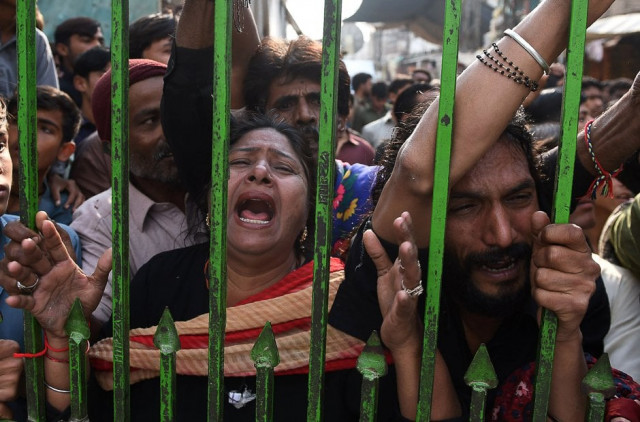New wave of terror: Why are we still fighting?
Pakistan’s internal weaknesses and regional troubles must be addressed in order to ensure lasting peace.

Devotees gather outside closed gate of Lal Shahbaz Qalandar shrine after a suicide attack killed over 80 people. PHOTO: AFP
Since June 2014 when operation Zarb-e-Azb was launched as a decisive battle against terrorism, February 2017 was the first time that frequent terrorist attacks happened in a short span of time.
This resurgence of terrorism was shocking but not unexpected keeping in view the lack of focus in the war on terror, which can never be won by military operations alone. Terrorism in Pakistan is a complex phenomenon with roots in country’s internal weaknesses and issues ranging from border management to regional ties, which must be addressed in order to ensure lasting peace.
Political support
The military assault against terrorism was successful to a large extent but civilian and political support to anti-terror efforts has not performed well.
Complete implementation of the National Action Plan, drafted after Peshawar school attack in 2014, is still awaited. Curtailing funding to terrorists, stopping banned outfits from operating under new names, preventing activities of proscribed groups have yet to be implemented fully.
Apex committees were formed to ensure coordination but inter-provincial management on terrorism is still ineffective. National Counter Terrorism Authority has been ignored for long and lack of political will to carry out operation against banned outfits in Punjab all are examples of the government’s confused policies.
Punjab leaders: Security brass irked by presumed terror links
Justice system
The delay in judicial reforms and urge for revival of military courts is another example showing the government’s priorities. The military courts were established two years ago to give time for reforms in the judiciary, which was proving ineffective due to issues in tackling proceedings of terrorists but nothing substantial has been done so far.
Cracks in security apparatus
The government has openly accepted security lapses in the wake of terror attacks but has done nothing so far to address the problem. The video released of the suspected suicide bomber entering Lal Shahbaz Qalandar’s shrine reveals how security apparatus failed at operational levels. There was no walkthrough gate at the entrance and, due to the large crowd, the bomber was able to cross the security line without checking. Besides, there are other questions as well. How did the suicide bomber travel to the attack site undetected and how explosives were moved without anyone noticing them?
Sehwan bomber captured on camera, police claim
Furthermore, the recent attacks highlight the issue of facilitators and terror elements within the local population. Tehreek-e-Taliban Pakistan (TTP) and Jamaatul Ahrar elements were active in the cities but security agencies were unable to smell it before the devastations. The security agencies in Lahore even failed to stop the attack when intelligence reports had warned of possible assaults in advance.
Terror groups
In the past, decision-makers believed in the separation between good and bad Taliban. It was assumed that militants who were not carrying out attacks in Pakistan, namely Afghan Taliban and Haqqani network, were dubbed as safe. Similarly, despite bans, Hafiz Saeed and his supporters were openly operating in Pakistan until last month when he was put under house arrest. Clarity on this policy is important to move forward and get results.
Regional rivalries
Externally, ties with regional countries do affect the war on terror. India and Afghanistan accuse Pakistan of supporting terrorists launching attacks in their countries while Islamabad in turn blames these countries support terror attacks in Pakistan.
TTP, its faction Jamaatul Ahrar and Islamic State, all based across the border in Afghanistan’s eastern province, claimed responsibilities for the fresh attacks across Pakistan. India’s support to separatists in Balochistan is also no secret with Indian premier Narendra Modi and Indian National Security Adviser Ajit Doval making supporting statements at different occasions.
Certain neighbours using Afghan soil for terror attacks in Pakistan: Qureshi
As Pakistan evaluates its strategy against terrorists in the face of rising violence, it is important to address the above-mentioned issues as they are critical for an effective fight. Joint efforts by Pakistan and Afghanistan for border management would definitely make cross border movement of terrorists on both sides difficult although not impossible as Pakistan and Afghanistan have a 2,600-km-long porous border between them.
The regional countries should also be encouraged to address each other’s concerns as differences between Pakistan, Afghanistan and India are serving no one’s interest and only promoting terrorism in the region. Regional stability is in Pakistan’s national interest and Islamabad must take the initiative to address reservations of its neighbours and develop cooperative ties with them whilst concentrating on resolving its outstanding issues like Kashmir through peaceful means.
Finally, for implementing the plan of coordinated and clear policies, stable civil-military relations are very crucial. Pakistan’s internal and external policies should serve the purpose of achieving the strategic goal of peace at home; contradictions in them would have negative effects on counter-terrorism efforts.
Imdad Hussain is an Islamabad-based journalist specialising in diplomatic and security issues



















COMMENTS
Comments are moderated and generally will be posted if they are on-topic and not abusive.
For more information, please see our Comments FAQ